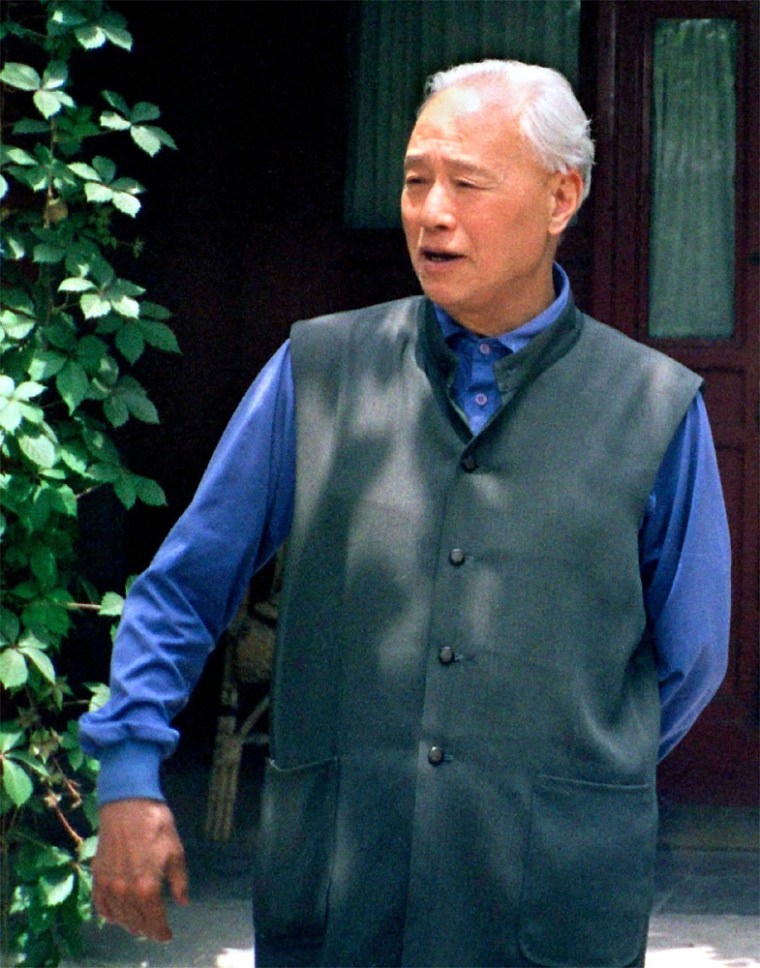Zhao Ziyang, who was purged as China’s Communist Party leader after the 1989 Tiananmen Square pro-democracy protests, is ill but in stable condition, the government said Tuesday, denying a report that he had died.
“Zhao Ziyang is an old man, more than 80 years old,” Foreign Ministry spokesman Kong Quan said at a regular media briefing. “He fell ill a couple of days ago, but now his condition is stable. Some reported his death on the eighth of this month, but this is totally not true.”
Kong’s comment was an extremely rare official disclosure about Zhao, 85, who has been under house arrest for more than 15 years after losing a power struggle in the chaotic aftermath of the military crackdown on the demonstrations.
It came in response to a Tuesday report by the Hong Kong newspaper Oriental Daily News that Zhao had succumbed Saturday to respiratory failure and complications from heart disease.
Fears of unrest
The government usually fails to respond to requests for information about Zhao, a sign of Communist Party unease about his lasting potency as a political symbol and fears that his death could spark widespread discontent.
The Foreign Ministry’s explanation of Zhao’s condition came hours after a veteran dissident said the deposed Chinese leader had spent the last month in the hospital.
Zhao has been hospitalized for lung problems, said Frank Lu, who was imprisoned for a year for organizing protests in central China supporting the Tiananmen demonstrators and now lives in Hong Kong. Lu said he spoke to Zhao’s daughter, Wang Yannan, who is in Beijing.
“She said he’s been in the hospital for about a month but he’s not in danger,” Lu said. “She said it wasn’t heart disease but a problem with his lungs.”
Wang also denied the newspaper report of her father’s death.
“She laughed,” Lu said. “She didn’t seem too worried.”
Fall from favor
Before he was purged, Zhao was the chosen successor of then-supreme leader Deng Xiaoping, spearheading bold economic reforms. He was the articulate public face of the party’s struggle with social and political change in the late 1980s.
But in 1989, he fell from favor and was dismissed after being accused of sympathizing with the demands of nonviolent protests that centered on Tiananmen Square. Hundreds, perhaps thousands, of demonstrators were killed in the crackdown.
Zhao was last seen in public May 19, 1989, when he visited the square to talk to student hunger strikers. In tears, he apologized to the protesters, saying: “I have come too late.”
Former President Jiang Zemin, then a little-known former Shanghai mayor, replaced Zhao and went on to head China’s Communist Party and military. He led China through 13 years of stunning economic growth before stepping down as party leader in 2002.
Zhao has been under strict house arrest in his Beijing home since he was ousted. In an essay published last year in the Asian Wall Street Journal, his former secretary, Bao Tong, wrote that Zhao’s front door is latched shut from the outside with a bicycle padlock “in the same way as peasants secure their livestock.”
Zhao spent his 85th birthday in October in his home, as groups of his relatives and former subordinates — sometimes numbering more than 100 — gathered outside, asking to see him.
Human rights groups say pressure has been mounting for his release because a growing number of Chinese officials are sympathetic to Zhao.
In recent years, Chinese leaders have been trying to suppress demands that they declare the 1989 protests a patriotic movement, overturning the verdict that they were anti-government riots that had to be crushed.
